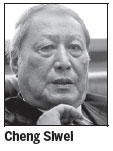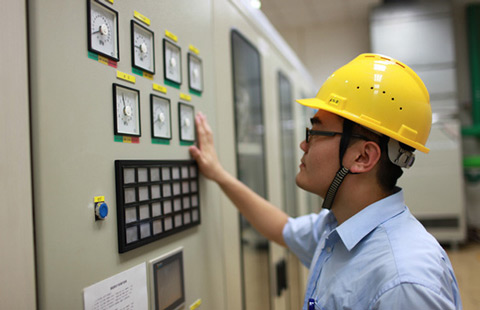Top economist made major contributions
Updated: 2015-07-13 07:35
By China Daily(China Daily USA)
|
||||||||
Cheng Siwei, one of the country's leading economists and a former vice-chairman of the Standing Committee of the National People's Congress, the country's top legislature, died of illness on July 12. He was 80.
Cheng was born in June 1935 in Hunan province. He was known as the father of China's ChiNext stock market, a Nasdaq-style board of fast-growing enterprises listed on the Shenzhen Stock Exchange, and the man behind the development of the venture capital sector in the country.
In 1998, during a session of the Chinese People's Political Consultative Conference, the country's top political advisory body, Cheng raised a crucial proposal to speed up the establishment of the venture capital market to foster the high-tech industry.
One year later, the government issued the country's first comprehensive set of regulations on venture capital. The move allowed venture capital intermediaries to take the form of a limited liability corporation or a joint stock limited company.
Cheng's research also focused on subjects including complexity science, chemical systems engineering and management science. In recent years, Cheng devoted himself to the use of complexity science, which taps on mathematical modeling, to study issues related to the country's development and reform.
To that effect, he led major efforts to explore and explain the characteristics of fictitious economy, and further promoted the growth of venture capital in China.
The Brookings Institution, a US think tank, hosted Cheng as a speaker as part of efforts to learn more about China's 12th Five-Year Plan (2011-15), including top-level policy issues.
Cheng once said that the economy can guarantee today's development, technology can guarantee tomorrow's, and only education can guarantee a sustainable future.
He published several well-known books, including Economic Reform and Development in China. There are nearly 300 publications at home and abroad to his name.
Zhu Jidong, deputy director of the State Cultural Security and Ideological Construction Center under the Chinese Academy of Social Sciences, said Cheng was a "kind, profound and patriotic" economist who played an active role in the country's economic development.
"In political consultation, he made very practical and constructive suggestions to policymakers during the annual two sessions of the country's top legislature and political advisory body, and various economic forums," Zhu said.
As a leading economist with his finger on the pulse of the country's development, Cheng made deep impressions on people who met him and sought out his valuable insights. Many of them lauded his integrity and courage to put forth what he thought was correct.

In one media interview, Cheng criticized Chinese banks for fluctuating loan rates but not deposits - making what he said were "huge profits for themselves but not the people". The banks should have "felt embarrassed by earning money that way", he said.
Cheng also had a stellar reputation as a scholar and his prodigious output of publications reflected his interests in the economic and social development of China and the world at large.
In 2002, he became dean of the School of Management under the Graduate University of the Chinese Academy of Sciences.
On Sunday, the school posted a statement on its website, which said that Cheng had devoted his life and talent to the country's reform and progress. He made "marvelous contributions" to the nation's economic development, education of the younger generation and exploration of cutting-edge areas in economic theory.
Cheng was once quoted as saying that all he wanted was "to do something to make the country strong and prosperous".
Wang Qian, Zhao Huanxin and Cai Xiao contributed to the story

(China Daily USA 07/13/2015 page1)

 Beijing roasts in high temperature
Beijing roasts in high temperature
 The world in photos: July 6-12
The world in photos: July 6-12
 Djokovic downs Federer to win third Wimbledon crown
Djokovic downs Federer to win third Wimbledon crown
 Top 10 Chinese companies by profit margin in 2015
Top 10 Chinese companies by profit margin in 2015
 No room in the pool
No room in the pool
 Top gaokao scholars saddle up for a ride in the park
Top gaokao scholars saddle up for a ride in the park
 Girl who shoots straight with bow and arrow
Girl who shoots straight with bow and arrow
 Ten photos you don't wanna miss - July 10
Ten photos you don't wanna miss - July 10
Most Viewed
Editor's Picks

|

|

|

|

|

|
Today's Top News
Mexico: Drug lord 'El Chapo' Guzman escapes, manhunt begins
Lawyers held for 'trying to influence verdicts'
Top court official under inquiry for graft
It is wrong to label illegal immigrants refugees: Opinion
Leaders agree on partnership blueprint
New Development Bank launched in Ufa
IMF keeps 6.8% China growth view
Leaders agree on partnership blueprint
US Weekly

|

|






